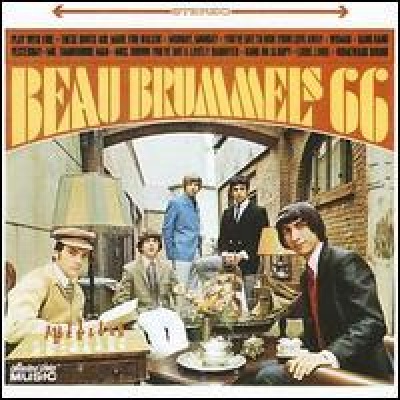
Beau Brummels 66
by Lindsay PlanerWhile it has gotten a bum rap in the wake of their subsequent masterpieces, the San Fran-based Beau Brummels major-label debut -- simply titled Beau Brummels 66 -- includes a dozen solid remakes of concurrent pop, folk, and rock tracks. The lineup consisted of Ron Elliott (guitar/vocals), Sal Valentino (vocals), Ron Meagher (bass/harmonica/guitar/vocals), Declan Mulligan (guitar/harmonica/vocals), John Petersen (drums/vocals), and for a brief time Don Irving (guitar), who filled in for Elliott. In an era marred by marginal (at best) cover bands, the Beau Brummels reveal considerable talents as interpreters of other people's hits -- although none of these selections are destined to surpass the originals. Of the three Beatles-related entries, the Paul McCartney-penned "Woman" -- which Peter & Gordon took into the Top 20 -- is the most appealing. The delicate baroque arrangement serves the storyline well and the combo's natural penchant for effortlessly adopting the British Invasion style ultimately contributes to the authenticity of this version. They arguably one-up the Byrds' "Mr. Tambourine Man" by including Bob Dylan's alternate verses. Paul Simon's "Homeward Bound" is treated sensitively, but the intimacy is lost once the robust choir chimes in during the chorus. One rather unanticipated gem is the dark menacing overhaul of "These Boots Are Made for Walkin'." With creepy minor chords crawling through the song, it has a sense of foreboding that isn't easily dismissed. In the same vein, the update of Sonny Bono's "Bang Bang" takes on an ominous mantle of uncertainty. Less convincing are the Beau Brummels' spin on "Play with Fire" from the Rolling Stones songbook, while "Louie, Louie," "Hang on Sloopy," and the inconsequential "Mrs. Brown You've Got a Lovely Daughter" uniformly detract more than they add to the proceedings. In short order, Elliott and Valentino would reestablish themselves as the creative force behind the unit and reappear with the highly lauded Triangle (1967) and Bradley's Barn (1968) platters.
